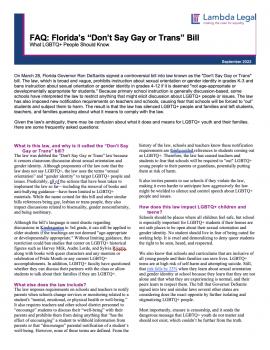
FAQ: Florida's "Don't Say Gay or Trans Bill": What LGBTQ+ People Should Know
On March 28, Florida Governor Ron DeSantis signed a controversial bill into law known as the "Don't Say Gay or Trans" bill. The law, which is broad and vague, prohibits instruction about sexual orientation or gender identity in grades K-3 and bans instruction about sexual orientation or gender identity in grades 4-12 if it is deemed "not age-appropriate or developmentally appropriate for students." Because primary school instruction is generally discussion-based, some schools have interpreted the law to restrict anything that might elicit discussion about LGBTQ+ people or issues. The law has also imposed new notification requirements on teachers and schools, causing fear that schools will be forced to “out” students and subject them to harm. The result is that the law has silenced LGBTQ+ people and families and left students, teachers, and families guessing about what it means to comply with the law.
Given the law's ambiguity, there may be confusion about what it does and means for LGBTQ+ youth and their families. Here are some frequently asked questions:

